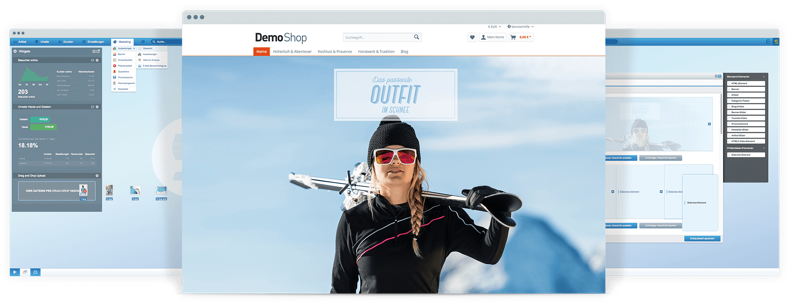- License: GNU General Public License v3 (some used parts have different licenses, which can be found in the respective files or directories)
- GitHub Repository: https://github.com/shopware5/shopware
- Issues: https://github.com/shopware5/shopware/issues
Shopware 5 is an open source e-commerce software made in Germany.
Based on technologies like Symfony 4, Doctrine 2 & Zend Framework Shopware comes as the perfect platform for your e-commerce project.
Furthermore, Shopware 5 provides an event-driven plugin system and an advanced hook system, giving you the ability to customize nearly every part of the platform.
- PHP 7.4.0 or above
- Apache 2.2 or 2.4
- Apache's
mod_rewritemodule - MySQL 5.7.0 or above
- ctype
- curl
- dom
- filter
- hash
- iconv
- gd (with freetype and libjpeg)
- json
- mbstring
- OpenSSL
- session
- SimpleXML
- xml
- zip
- zlib
- PDO/MySQL
- fileinfo
Follow the instruction below if you want to install Shopware 5 using Git.
1.) Clone the git repository to the desired location using:
git clone https://github.com/shopware5/shopware.git
In case you wish to contribute to Shopware, fork the 5.7 branch rather than cloning it, and create a pull request via GitHub.
For further information please read the section "Get involved" of this document.
2.) Set the correct directory permissions:
chmod -R 755 custom/plugins
chmod -R 755 engine/Shopware/Plugins/Community
chmod -R 755 files
chmod -R 755 media
chmod -R 755 var
chmod -R 755 web
Depending on your server configuration, it might be necessary to set whole write permissions (777) to the files and folders above. You can also start testing with lower permissions due to security reasons (644 for example) as long as your PHP process can write to those files.
3.) A Makefile may be used to set up the configuration and database connection:
- Copy
.env.distto.envand modify variables if needed make init
Info regarding platform inter-compatibility
The Makefile is intended to work with Linux and Mac systems alike which means that we're not able to use all features of modern GNU make.
Some workarounds are in place because of this and place constraints on the functionality of this way to set up Shopware
(there might be issues when using special characters inside the variables of the .env file).
The Makefile is therefore only to be used for testing and development setups at the moment.
4.) Download the test images and extract them:
Go to the root directory of your shopware system and download the test images:
wget -O test_images.zip http://releases.shopware.com/test_images_since_5.1.zip
Unzip the files inside the root directory:
unzip test_images.zip
You can now access your shop. The test_images.zip file also includes thumbnails for the responsive theme.
The backend is located at /backend example http://your.shop.com/backend.
Backend Login: demo/demo
If you want to have full-featured demo data, you should download the respective demo data plugin in the First Run Wizard or in the Plugin Manager.
- Customer: test@example.com / shopware
- B2B: mustermann@b2b.de / mustermann
Shopware is available under GPL v3 license. If you want to contribute code (features or bugfixes), you have to create a pull request and include valid license information. You can either contribute your code under New BSD or MIT license.
If you want to contribute to the backend part of Shopware, and your changes affect or are based on ExtJS code, they must be licensed under GPL V3, as per license requirements from Sencha Inc.
For more information about contributing to Shopware, please see CONTRIBUTING.md.
We've always had an ear for our community, so please feel free to submit issues with bug reports or feature requests. Just create a new issue here using the respective templates.
Shopware is distributed under the AGPL v3. You can find the whole license text in the license.txt file.
The changelog and all available commits can be found here.


